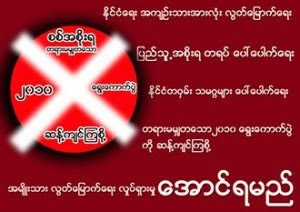The recent claim of North Korea that it has carried out the first nuclear weapon’s test has shaken around the world and the World powers are now urging the UN Security Council to impose necessary and appropriate actions. As Burma is also planning to seek nuclear power capabilities, I would like to discuss some issues related to nuclear proliferation, nuclear weapons and nuclear power capabilities.
According to the Treaty on the Non-Proliferation of Nuclear Weapons (NPT), only five countries such as China, France, Russia, the United Kingdom and the United States are acknowledged as possessing nuclear weapons. However, there are some other countries that have the nuclear weapons and capabilities and the expansion of nuclear club has become an important global issue.
On 11th January 2002, Burma has announced to join the nuclear club. It claimed as a reactor for medical research facilities. In November 2001, the International Atomic and Energy Agency (IAEA) in Vienna sent an inspection team and it reported to the world that the safety standards were very low. Despite of this report, the military regime of Burma continued their actions to seek nuclear power capabilities with the help of Russia. Burmese military officers were sent to Russia and trained in the context of nuclear technology.
Although Burmese Military claimed as a research reactor, a lot of countries in Asia had raised concerns about the prospect of Burmese nuclear proliferation because the same technology can be used for medical research capabilities as well as creation of nuclear weapons components.
The main difference between nuclear reactors and nuclear weapons does not depend on the technology. It only depends on the management of nuclear chain reaction and the nature of the energy produced. In a nuclear reactor, output is achieved through a sustained and regulated process, whereas, in a nuclear weapon, the objective is to attain a large explosive yield by creating a mass of nuclear material as a result of a rapid chain reaction. (Gardner, 1994:6)
Howlett (2005) mentioned that the usual route for any state or non-state actor seeking to acquire nuclear weapons would be via the development of the necessary technological infrastructure (Howlett, 2005:503). A major factor of nuclear proliferation process is the acquisition of technologies to produce fissile materials for a fission (nuclear weapon) or fusion (thermonuclear weapon). On the other hand, the nuclear reactor involves means to regulate the chain reaction. The problem is that some countries claimed as a nuclear reactor at first, but they seek to acquire the nuclear weapons in a real sense before the world knows. On 30th November 2005, US accused Burma of nuclear goal. If Burma seeks to start the nuclear proliferation process, it can affect the stability of South East Asian region with a large scale.
According to Waltz, a scholar of International Relations, rational Deterrence would work among the new nuclear states. He took the analogy to MAD (Mutually Assured Destruction) during the Cold War. However, Sagan argued that Professional military organizations, because of common biases, inflexible routines, and parochial interests, display organizational behaviors that are likely to lead to deterrence failures and deliberate of accidental war.
Because new nuclear-armed states are likely to have military-run or weak civilian governments, they will lack the positive constraining mechanisms of civilian control while military biases may serve to encourage nuclear weapons use, especially during crisis…….. (Waltz and Sagan, 1995)
In the case of Burma, the prospect of nuclear states will be run by the military regime that has gunned down its own citizens. So the security and stability of the world may be seriously affected if Burma gained nuclear power capabilities.
In conclusion, I would like to appeal to the international community not to treat Burma issue as a local issue. In fact, it is a regional and global issue that can threaten the stability of the World.
Khin Ma Ma Myo (15/10/2006)


































